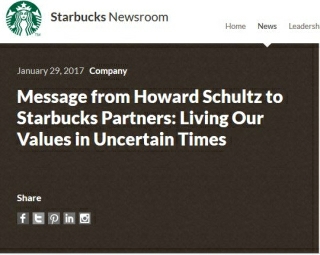CEOs Respond to Trump's Executive Order
 The New York Times reports "Frantic Phoning Among CEOs" about how they should address President Trump's ban on travel from Muslim-majority countries. Leaders want to oppose the ban but are concerned about "poking the bear," according to the article. The new president has taken tweet jabs at others, for example, the union leader involved in Carrier negotiations when he spoke out.
The New York Times reports "Frantic Phoning Among CEOs" about how they should address President Trump's ban on travel from Muslim-majority countries. Leaders want to oppose the ban but are concerned about "poking the bear," according to the article. The new president has taken tweet jabs at others, for example, the union leader involved in Carrier negotiations when he spoke out.
In a statement on the Starbucks website, Schultz opposed initiatives around DACA, building a wall, the Affordable Care Act, and immigration. He pledged to employ 10,000 refugees.
Mark Zuckerberg and Tim Cook also have come forward. Cook focused on Apple, of course: "In my conversations with officials here in Washington this week, I've made it clear that Apple believes deeply in the importance of immigration - both to our company and to our nation's future. Apple would not exist without immigration, let alone thrive and innovate the way we do." Other tech company leaders have weighed in their opposition: Airbnb, Uber, Lyft, Facebook, Google, Apple, Amazon, Expedia, and Microsoft.
The Times called financial firms' response more "moderate." For example, Lloyd Blanfein of Goldman Sachs said, "For us to be successful, our men and women must reflect the diversity of the communities and cultures in which we operate. That means we must attract, retain and motivate people from many backgrounds and perspectives. Being diverse is not optional; it is what we must be."
The article also noted energy and heavy industries' "mixed-bag" response, consumer and retail companies' resistance, and media and telecom's "no comment."
Discussion:
- What risks and rewards do CEOs face in addressing the travel ban?
- Why are industries responding differently? What does each have to lose or gain?
- Assess Howard Schultz's statement. While others are questioning how and whether to respond, he is on it. Why?
